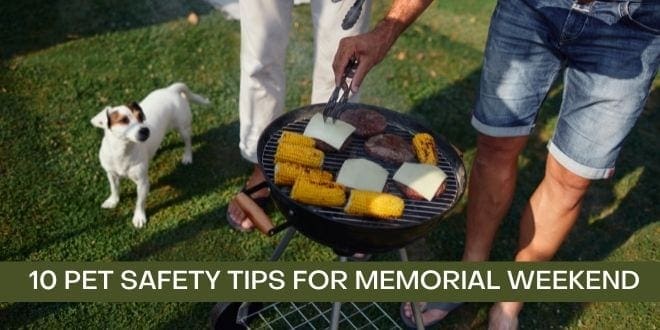
Wishing you and your pets a wonderful and safe Memorial Day weekend. As you’re getting ready for those cook-outs and picnics and the start of summer, keep these 10 pet safety tips in mind:
Tip #1: Keep water handy. If your pet is outdoors with you be sure to have fresh water handy and place the water bowls in the shade. Keep in mind that shade locations will change as the day goes by. Monitor the water level so you’ll know when it’s time to replenish. If it’s very warm out, place a couple of ice cubes in the water to keep it cool.
Tip #2: Always supervise around the pool. Don’t leave pets unsupervised near the pool. Even if you’re sure your dog or cat wouldn’t willingly jump into the pool, they could get pushed in by accident. A child may think it’s funny to place the dog or cat on a float in the pool so make sure everyone is always supervised.
Tip #3: Grill safety. Watch pets around hot grills, candles, or lanterns. The long tail or your dog or cat could easily swish too close to a candle lantern. When it comes to grills, the enticing smells could cause a dog to put their paws on the grill to try and reach the food. Small grills could be knocked over.
Tip #4: Provide access to shade. Be sure any outdoor dog or cat always has a comfortable place in the shade. Don’t tether a pet because shade locations will change during the day. Tethering also doesn’t allow an animal to move away from bees or other annoying insects.
Tip #5: Prevent sunburn. Ask your veterinarian before putting ANY sunscreen on your dog or cat. Sunblocks containing zinc oxide are toxic to dogs. Sunscreens containing salicylates, common in almost all sunscreens, have the same toxic effect as aspirin in cats. Shorthaired pets are more susceptible to sunburn. It’s also very common for the tips of the ears to get burned. Pets who sleep out in the sun on their backs are at risk of sunburn on their bellies. Common sense is the safest sun protection you can use with your furry family members by avoiding extended exposure to sun.
Tip #6: Parasite prevention. Outdoor cats and dogs should be up-to-date on any flea/tick/heartworm preventive prescriptions. If you’re celebrating in a wooded area, be sure to carefully check your pet over when you get home because ticks can hide just about anywhere – such as behind toes, in ears, in armpits, and under the tail. Do a thorough once-over.
Tip #7: Microchip. All pets allowed outdoors should be microchipped but it’s also extremely important for indoor cats who may not wear collars with identification (even at that, collars can come off). Having your pet microchipped is a very quick process done at the veterinary clinic and then you register your pet online. If your pet is already microchipped, this is a good time to go online and make sure all your contact information is up-to-date.
Tip #8: Keep indoor cats safe. For indoor cats, make sure guests coming in and out of the house don’t allow an escape. If your cat becomes uncomfortable around all the company then the best option is to place your cat in a separate room to enjoy the holiday weekend in peace and comfort. Guests may not realize that the cat is not allowed outdoors and so might not even say anything if your cat slips out the door. Kids going in and out may not completely close the door, allowing for a quick exit by a curious cat.
Tip #9: No special food. Keep your pets on their regular food and don’t offer table scraps or leftovers. Your family may be well aware of this but guests may not so instruct visitors not to supply your pets with extra bites of food. Clean up any accidental spills as well. The last thing you want to do on a holiday weekend is have a dog or cat with intestinal problems.
Tip #10: Watch the temperature. Keep your pets indoors if the temperature gets uncomfortable. If you’re uncomfortable with the temperature then your dog or cat will certainly be uncomfortable as well. Use your common sense when it comes to whether your pet is truly comfortable outdoors, even in the shade, if the temperature is too high or the humidity level is elevated. Your beloved pet may want to be with you but the health and safety risk may be too high.
Need More Information?
For more information on cat behavior and training, refer to the books by Pam Johnson-Bennett. Pam’s books are available at bookstores and online. We’ve included links to Amazon here on our website.
If you have a question about your cat’s behavior or health, contact your veterinarian. This article is not intended as a medical diagnosis nor is it a replacement for your cat’s regular veterinary care. This article is for general information purposes only.
 Problem Solving & Advice by Pam Johnson-Bennett Cat Behavior Expert & Best-selling Author
Problem Solving & Advice by Pam Johnson-Bennett Cat Behavior Expert & Best-selling Author



